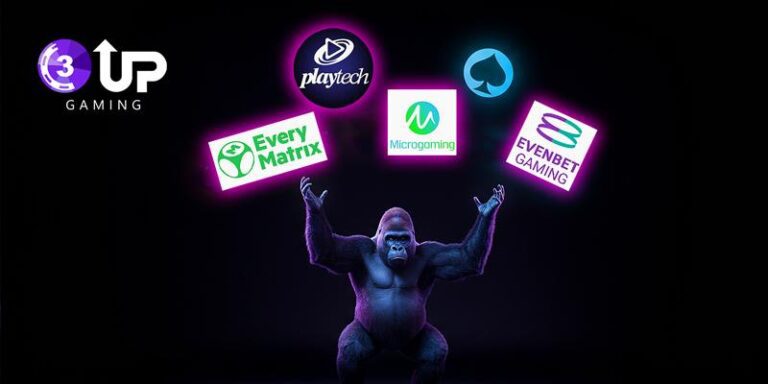Compare the Best Poker Tournament Software Providers! When comparing the best poker tournament software providers, it’s important to focus on functionality, scalability, and how well each solution adapts to modern technologies like cryptocurrency and blockchain. In 2025, platforms like 3UP Gaming, EvenBet, and Virtue Poker have emerged as leading names in the poker software space, each with unique strengths that cater to different types of operators and players.
3UP Gaming stands out for its deep crypto integration, offering a Web3-ready tournament platform that supports instant wallet connections through MetaMask, Trust Wallet, and TON. Operators can run customized multi-table tournaments, enjoy fast decentralized transactions, and benefit from features like Telegram bot integration and real-time analytics, all designed to maximize player engagement and revenue. On the other hand, EvenBet Gaming provides a more traditional approach with powerful backend tools, multilingual support, and broad market compatibility, making it a good choice for established operators who value stability and gradual innovation.
Compare the Best Poker Tournament Software Providers
Virtue Poker takes a different approach by focusing on decentralization and transparency through blockchain. It’s tailored more toward peer-to-peer experiences and DAO governance rather than full-scale commercial poker rooms. While it lacks some of the advanced tournament controls found in other platforms, it appeals to a niche audience interested in fairness, cryptographic trust, and community-driven gameplay.
Ultimately, the best poker tournament software for your business depends on your target audience, technical needs, and monetization goals. For crypto-first, global expansion, 3UP Gaming is a top-tier choice. For conventional enterprise stability, EvenBet holds strong. For decentralization and transparency, Virtue Poker offers a unique model for the future.
What Makes a Great Poker Tournament Software Provider?
It’s gone from just being a tool to being core infrastructure. In 2025, evaluating poker tournament software goes beyond just running blinds and brackets; it also involves an architecture that is able to scale up to a global, high-tech and legally-savvy audience. The bar for what a piece of professional poker software has to deliver has been lifted by the popularity of poker events run by influencers, tournaments with crypto buy-ins, and prize pools on the scale of something you would see in eSports.
Conditions of Tournament Infrastructure
What you should expect from a good poker tournament software provider are as under:
- Smooth MTTs, SNGs, satellites multi-table functionality
- Blind adjustment and prize-pool levels in real-time
- Server-side stability for thousands of concurrent users
- Backend control panels for game setup, admin control, and payout logic
Solid white-label poker software or custom poker software may hit serious issues if deployed without proper testing as "fast-launch" solutions to be avoided completely post ongoing complaints, crashes and delays which can be found even in well-funded projects.
White-Label vs Custom Systems
In 2025, these are the two models that you will see take center stage:
- White-Label Tournament software: A ready-to-use system that caters to clubs, influencers or crypto project that are looking to deploy poker fast
- Custom Software Builds: A bespoke tournament-ready system for platforms that are looking to expand on an international scale or create a branded poker experience.
PokerStars still tends to build in house, however, we are seeing that many smaller operators entering online poker in regions like LATAM, MENA, and Southeast Asia are leaning towards white-labeled online poker management systems as a way to scale without needing their precious infrastructure.
At the end of the day top providers will know and acknowledge that trust, technology and UX are table stakes, not table features.
Learn the difference: Lunch Your Own Poker App with a White Label Solution
Don’t miss this: AI vs Humans: Who Wins at Poker in 2025?
Top Features to Compare Among Providers
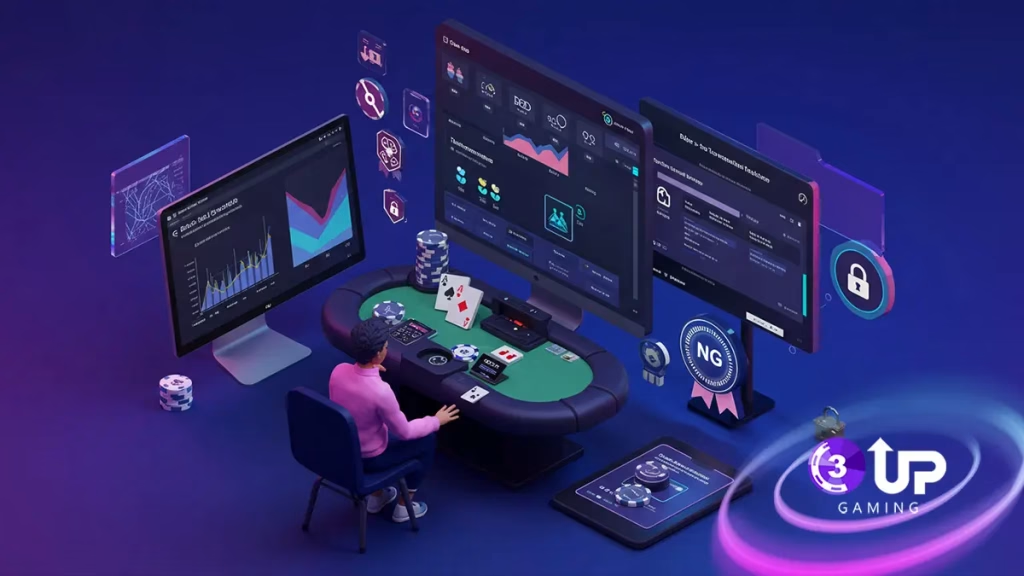
Especially in this rapidly changing ecosystem today, there is some poker software for every type of person. If you’re looking to host tournaments, you better know how to compare poker tournament software providers by the feature sets that actually matter, whether you’re a solo club manager, a white-label startup, or a venture-backed operator.
GGPoker-like poker operators, who ban HUDs to achieve a smooth playing field or Stake which was designed to fully support Crypto UX, have materially reset the user expectations bar. Now you have to build for both performance and polish, without really needing to decide between the two.
Multiplayer Scaling
- Support for 100 and 1000s of same-time tables
- Seamless table-switching throughout MTTs
- Tourney logic that works in real time with splits, breaks, bubbles
- An environment that can handle low-latency performance spikes due to network traffic
Mobile Support
- Native Android/iOS apps, or responsive web clients for smaller screens
- Tap-friendly UX and support for swipe gestures
- Continue to support background play and notifications
- Styling that accommodates various screen sizes
Trancements
- Omaha, 6+ Hold’em, or user-defined home-games
- Bounty events, shootouts or mixed formats
- NFT/table skins that swap for specific tokens (i.e. in some cases)
- Feature toggles for rebuys, addons, or late registration
It’s about fit, not just quantity. Nevertheless, the best poker game hosting platform will not be the one with the most features. It will be the one that features the most relevant to your user base and growth goals. Long-term, a provider with multi-table capacity, good UX and infrastructure that improves with scale will outcompete a flashier service that can’t handle actual usage.
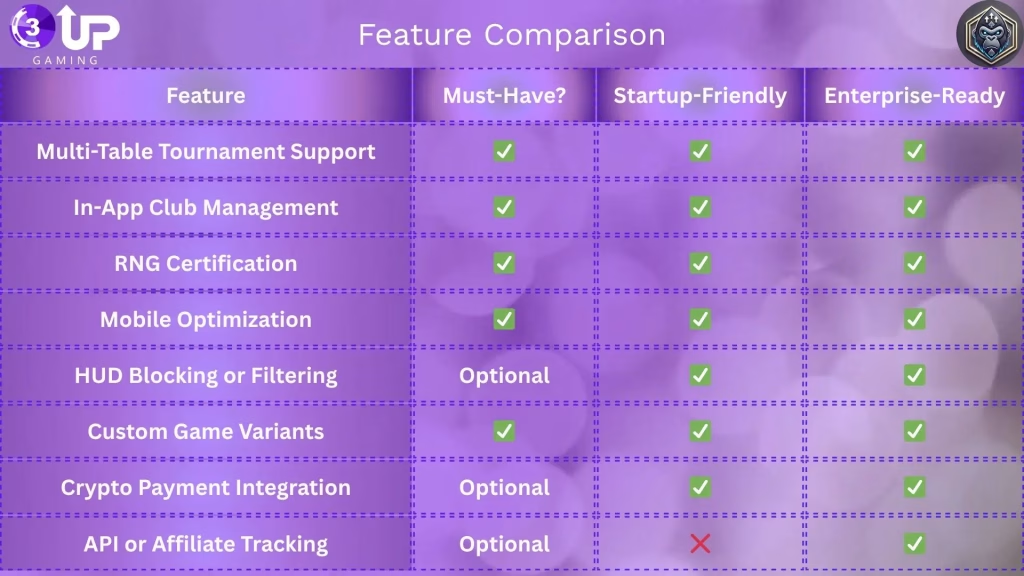
Pricing Models and Licensing Options
Knowing the cost of poker software is a strategic choice, not merely a financial one. Whether you are an independent organizer or building a scalable brand, the pricing model you choose will directly affect your control, margins, and legal exposure.
Global growth and the rise of models driven by fintech, providers oscillate between options of one-time sales, subscriptions, and rake-share hybrids. At the same time, licensing continues to be a local jigsaw; it is impacted by the regional gambling regulations, taxation policies, and compliance regimes.
Licensing authority example in pricing/licensing: Malta Gaming Authority
Don’t miss this: How Bots Are Changing the Game of Online Poker
One-Time vs SaaS Pricing
One-Time License Fee
- Best for: Operators who want long-term control
- Often includes source code or white-label rights
- Higher up-front investment, but no ongoing costs
SaaS / Monthly Subscription
- Ideal for: Startups and influencers exploring options
- Short-term lower cost but may become more expensive in the long run
- Usually hosted on the provider’s cloud or backend
Rake/Revenue Share Model
- Typical for white-label poker software setups
- Allows fast scaling but may limit your maximum profit
Global Licensing Impacts
Licensing is a local jigsaw puzzle. Each jurisdiction has different regulations for poker. Key models:
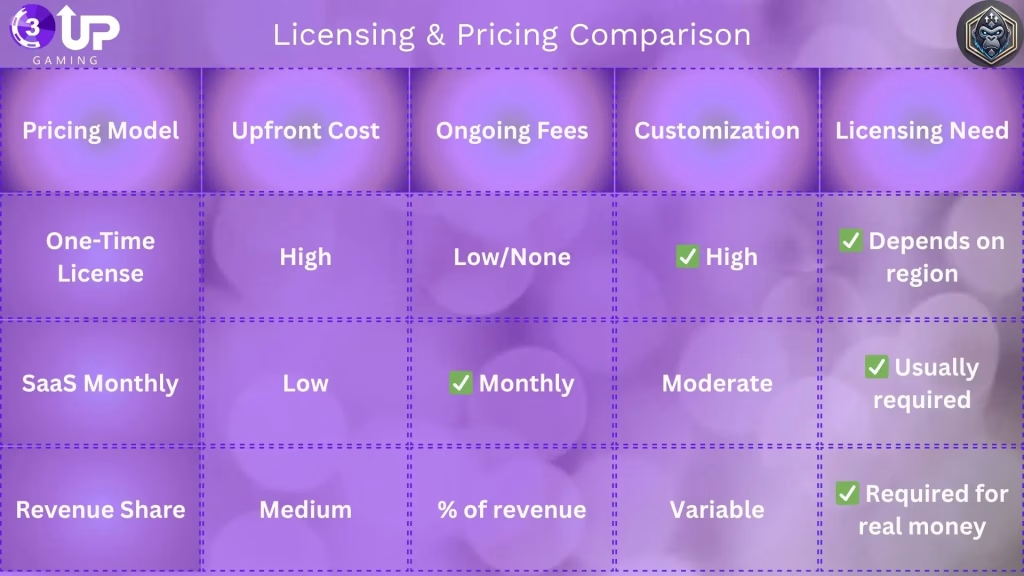
- Isle of Man, Malta, and Curacao are typically recognized for international platforms or cryptocurrencies.
- Regional licensing requirements are India, the UK, and the USA particularly for real money play.
- In some countries, the Play Money or Club-Based Model may allow one to circumvent licensing.
Aside from price, choosing a model also involves how you want to grow and run your poker ecosystem. You can scale quickly while maintaining compliance and margins with the correct white-label poker software.
Don’t play shorthanded; the correct software makes all the difference, whether you’re hosting club games or international MTTs. Choosing between rake share, SaaS, or full license isn’t just about budget, but it’s about ownership, compliance, and scaling smart, not fast.
Explore further: Your Gateway to Gaming Biz
Boost your game with: The Best White Label Poker Software Providers for 2025
User Interface and Player Experience

User experience was never treated as an after-thought but is now the real deal-consolidator in the contemporary poker economy. With influencers, streamers, and YouTubers actively reviewing and ranking these platforms on the basis of responsiveness, aesthetics, and ease of use, your poker game software UX alone can make or break the success of your platform.
Creators of high-profile repute such as Lex Veldhuis and Spraggy have openly spoken against slow-loading tables and the chip slider functionality and praised designs that sincerely help quick decision-making, with smooth animations and multi-table layouts fast in reaction. To put it simply, players would expect smoothness and not friction.
Mobile UX Vs Desktop
Players just don’t put up with friction anymore. More than 70% of poker users currently play on mobile applications as their primary channel. Fine poker site UI should be effortless on a mobile: clear chip controls, fast login, fast card animation; on the other hand, desktop clients should cater much more to multi-table views and offer hotkey support that is user-friendly, especially for grinders.
3UP Gaming-style brands have very much embraced the paradigms of design-first coupling real-time interactivity with beautiful minimal interfaces. They also love to keep the dashboard clean and allow a full skinning theme, which is great for white-label resellers and private club operators alike.
Are you fed up with delayed updates and malfunctioning features? Examine providers now to ensure your tournament strategy is future-proof.
Read more about: Top Poker Software Developers for Building Winning Platforms
Capture what you need with: Building Scalable Poker Platforms: Software Architecture Guide
Security Standards and Anti-Cheat Tools

Trust is paramount in online poker, and once it is lost, it is hardly something that can be demanded. With the new 2024 incidence of RTA tools and collusive underground rings, the demand for secure poker software has hit its highest peak ever.
Since then, the players and the software providers find themselves constantly under scrutiny for just maintaining gameplay’s integrity alongside player data. Strong anti-cheat measures are not just another feature, but a premium good for both operators and investors.
RNG Certification
- Random Number Generators (RNGs) must be certified by an independent lab such as GLI or iTech Labs.
- Certification attests the card distribution is provably fair and tamper-proof.
- No certification, and regulators and pros, too, will be walking away.
Anti-RTA Measures
- Detection systems for pattern-based RTA tools
- Behavior tracking: suspicious win rates, action timing, cross-hand analyses
- Server-side flagging of bot-like repetition or unnatural movements
Geo/IP Tools
- Geofencing: block unauthorized jurisdictions
- IP clustering: block collusions (players physically sing one location)
- Automatic blocking of VPNs used for multi-accounting
If you’re not actively protecting the game, you’re not protecting your players or your business.
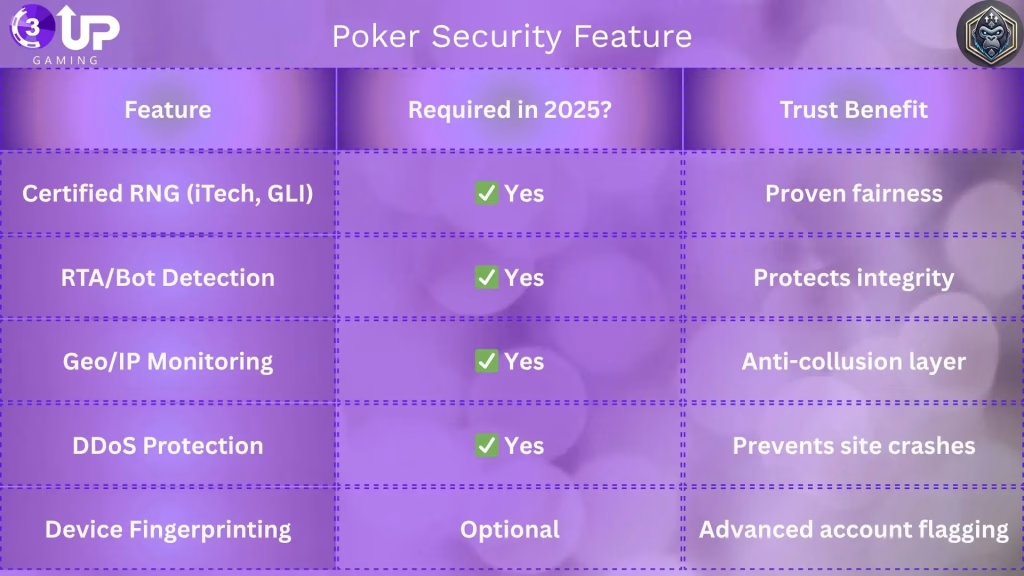
In addition to protecting players, the top anti-cheat poker systems convey legitimacy to influencers, high rollers, and possible business-to-business partners. You’re not in the game if you’re not protecting your game.
Walk on the line by: How to Buy Real Money Poker Apps Safely
More on that in How to Build a Secure Online Poker Platform
Integration with Existing Poker Platforms
Integration isn’t just a concern for giant platforms, it’s essential whether you’re hosting 20 friends or 20,000 players. It is flexibility that is paramount in the fragmented iGaming economy today.
An excellent solution for poker tournaments should integrate seamlessly with creator ecosystems, club poker software, new layers of finance such as tokenized buy-ins, and cryptocurrency wallets. With wallet token support, influencer monetization, and affiliate APIs rising in use, the best poker software behaves like a full-stack growth partner.
Wallet/Token Systems
Many new platforms are trending towards decentralized cashier tools, or semi-decentralized at best, especially while crypto grows in adoption.
Now there is support from some providers for Ethereum, USDT, or Solana wallets to allow for seamless global buy-ins and prove cross-border hosting of clubs. It’s not only storing money; it’s financial access, KYC procedures, and automatic payout in tokenized chips or stablecoins.
Similar wallet systems are also being used by creators and streamers to conduct sponsored games, in-app stores, or NFT-enabled tables to monetize engagement beyond rake, just like in esports platforms using Twitch extensions or native OBS donations flows.
Club-Based Structures
The affiliate club model is a tiered hierarchy where operators run their own tables, advertise private tournaments, and coordinate community onboarding-as it is, the heart of the majority of new poker systems.
Several leading poker software providers now allow NP full poker API support, allowing the top-notch organizations or resellers to incorporate registration, cashiering, and reward distribution into their portals or marketing stacks.
Integration is modern poker`s growth, be it for onboarding 20 buddies or for scaling to 20,000 players.
Ready to launch your poker platform with a big splash? Don’t worry, we’ll help you make the right choice. So, start by picking the perfect software partner.
Want smarter decisions? Bitcoin Poker UI Wins Big in 2025
Find your time with: Boost Player Growth with Poker Affiliate System Software
Customer Support and Service Reliability

You can have the best software features in the world, but if the support isn’t there when something inevitably goes wrong, it’s kind of useless.
The unsung heroes and heroines that make our gambling platforms shine are in charge of taking care of it all. Without these modules, the best software in the world is actually useless-there is no point if you are lagging behind in communication or resolution times.
In the past year several clubs divorced their white-label providers after scores of clients complained about payout errors, a lack of updates, and support tickets in a time vacuum, and many of these smaller niche providers have had a reckoning.
Rarely will someone take action to insure things are being handled smoothly, or there in the case of an issue. On the more expensive and larger networks the larger poker software vendors will have real time chat or even account managers on call. Do they push out new features?
The further you scale the more you need from a poker operator than just fixes, and more or less often than not functional partners to provide analytics dashboards, multilingual capabilities, affiliate customer support, and flexible infrastructure.
In the software business, what often ends up happening is that the operators who are treated as partners instead of clients, are the players that never leave and truly build those community bonds which last the longest.
In 2025, reliability isn’t optional. It’s the bedrock of retention and the silent confirmation that whoever you went with was a good choice.
Arrange a demo to witness for yourself the edge that 3UP Gaming’s next-gen poker logic brings over the rest of the industry.
Reliability today is about more than uptime. It’s about having someone answer when it matters.
Easy road that you build? Buy User-Friendly Poker Software
Grasp more of: Top White Label Options for Poker Networks in 2025
FAQs about Best Poker Tournament Software Providers
Choosing the right poker platform isn’t just a technical decision. It’s a long-term strategy call. What you choose now sets the tone for your players, your brand, and your success.
1. What are the top poker tournament software providers in 2025?
In 2025, some of the bigger players are 3UP Gaming, BetConstruct, Gamio, EvenBet, and Pokerscript.net. Each provider promises a strong back-end engine, mobile-optimization infrastructure, security, and various tournament formats. Each has its specialty; some focus on enterprise support, others on scalability, while some pursue speed-to-launch.
2. How do I compare features between different providers?
Begin by breaking them down into core categories: multi-table support, mobile responsiveness, RNG certification, security tools, and integration possibilities. Set up side-by-side comparison tables or ask for demos. Prioritize those features most valued by your audience. For instance, esports brands will probably need media-layer flexibility and APIs, whereas club-level organizers will opt for simplicity.
3. Which provider offers the best value for money?
This depends entirely on how you operate. SaaS-style providers work well for clubs or creators seeking fast deployment coupled with low up-front cost. A one-time-license provider by contrast, such as 3UP Gaming, can be more profitable in the long run if one intends to scale and is very concerned with branding and control over his or her backend.
4. Are there free trials or demo versions available?
Yes, they do. Most of the serious operators will give you access to a demo, whether through sandbox settings or walks through with a sales agent. Some may even allow you temporary admin panel access to test out tournament logic or UI. This is the best way to spot red flags as early as possible.
5. Can I switch providers without losing player data?
If your current platform does not allow data export, and your new provider has a way to import data through an API, then yes you can probably migrate! We recommend providers that offer staff help or tools for player balance, histories & club structure transition.
6. What kind of technical support is available from each provider?
This can go from a simple ticket system to a full dedicated account manager. Find a company that has 24/7 response windows, iterates frequently, and ideally uses direct communication channels. Enterprise vendors, for high volume or B2B clients generally match you with a personal success lead.






